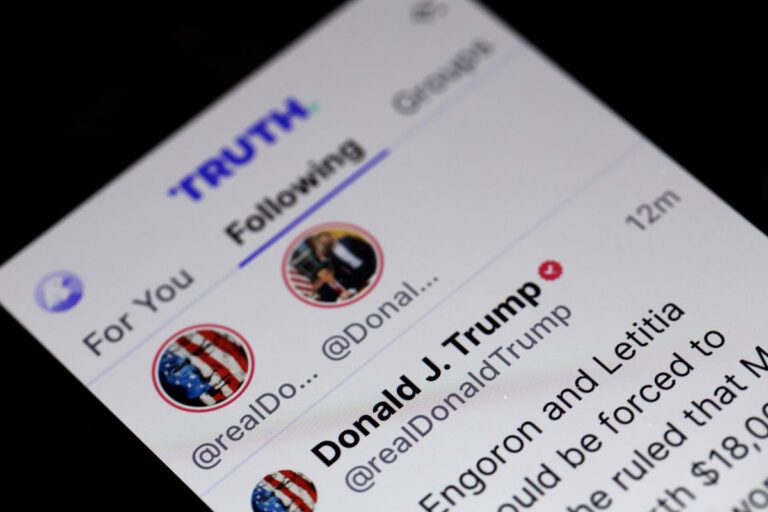
[ad_1]
Former President Donald Trump has clearly scored a financial windfall with his media startup, Trump Media & Technology Group, which trades under his initials, DJT. The firm’s value soared when it went public on March 26, with the stock up more than 16% on the day. Trump’s ownership stake could fetch more than $4 billion.
DJT is basically a meme stock, a kind of viral sensation that attracts investor interest beyond what the company’s fundamentals would ordinarily suggest. That obviously stems from Trump’s notoriety and the fervent belief some supporters have in his “make America great again” crusade.
The Trump company, which went public through a merger with Digital World Acquisition Corp. (DWAC), a special-purpose vehicle that’s been trading since 2021, has little revenue and lost $41 million during the last two years, according to S&P Capital IQ. Many buyers pushing up the stock price have been individual investors expressing loyalty to Trump himself.
But many investors are betting the Trump venture will flop. “There is huuuuge conviction (Trump pun intended) that there will be a significant decline in the stock price in the short term,” Ihor Dusaniwsky, managing director at S3 Partners, said in an email.
The short interest in DJT stock — bets that the price will fall rather than rise — is about 11% of outstanding shares, according to S3. That’s high, but not unprecedented: Average short interest in public companies is in the 3% to 4% range, though short interest can reach 40% or more if traders think a stock is doomed.
But there are very few DJT shares available to execute short trades, which makes it extremely costly to bet against the stock. That means elevated short interest is a strong indicator of negative views of the company’s prospects. “There is very little stock available to support new short sales,” Dusaniwsky said. “But short sellers are staying in this trade even while paying over 200 times the average stock borrow rate for a US short trade.”
And there’s plenty of anecdotal evidence that other buyers are betting on a bubble and hoping to sell before it pops. The stock “is dropping to $2.50 after the merger,” one investor posted on Reddit’s meme stock channel, WallStreetBets. Another suggested anybody holding the stock for the long haul is a “MAGA bagholder” who will basically end up putting money into Trump’s pocket.
Short sellers betting against DJT have lost money so far this year, since the stock has risen in anticipation of the finalization of the merger and Trump’s reemergence on public markets. But there are several reasons to think the Trump company will struggle and shareholders will suffer.
First, the Trump company’s main business, the Truth Social networking app, is a money-losing niche player that has no obvious advantage against competitors such as X and Facebook other than the divisive appeal of Trump himself.
Another risk is Trump’s own financial stake in the company, which has the same ticker symbol as a Trump casino company that went bankrupt in 2004. Trump owns at least 55% of the company, and his stake jumped by more than $1 billion as the stock popped when it went public. But Trump could have a strong incentive to sell shares to pay legal fees associated with four criminal cases he’s battling and two civil cases where he’s been assessed more than $500 million in penalties and fees.
Drop Rick Newman a note, follow him on Twitter, or sign up for his newsletter.
Trump has to wait six months before selling any shares in the public company, according to the terms of the merger. But that would still allow him to sell shares by October. The company board could also waive that rule, which seems plausible given that it’s composed of Trump cronies plus his son, Donald Jr.
If Trump sells shares in his own company or investors even think he’s likely to sell shares, that would put downward pressure on the stock price, as normally happens when any insider sells. If Trump dumped a lot of shares to raise money quickly, shares could plummet in value.
The stock price already swings on news related to Trump’s personal finances. On March 25, a New York court lowered the amount of money Trump must post while appealing a civil conviction for business fraud from $464 million to $175 million. Shares jumped nearly 20% on the news, since it suggested Trump might be less likely to sell his own company’s shares to raise money. For a publicly traded stock, that’s extraordinary sensitivity to one person’s financial disposition and it could easily go the other way if or when Trump suffers reverses.
A third risk is that Trump, likely to be the Republican presidential candidate in 2024, loses in November to incumbent President Joe Biden. A second loss to Biden would leave little political future for the 77-year-old Trump, except as a kind of Republican Party boss emeritus. Instead of being the “in” place for Trump supporters to converse, Truth Social would become a remnant of the Trump movement. One thing Trump’s company is, for sure, is a unique way to monetize your political beliefs about the outcome of the 2024 presidential election.
Rick Newman is a senior columnist for Yahoo Finance. Follow him on Twitter at @rickjnewman.
Read the latest financial and business news from Yahoo Finance
[ad_2]